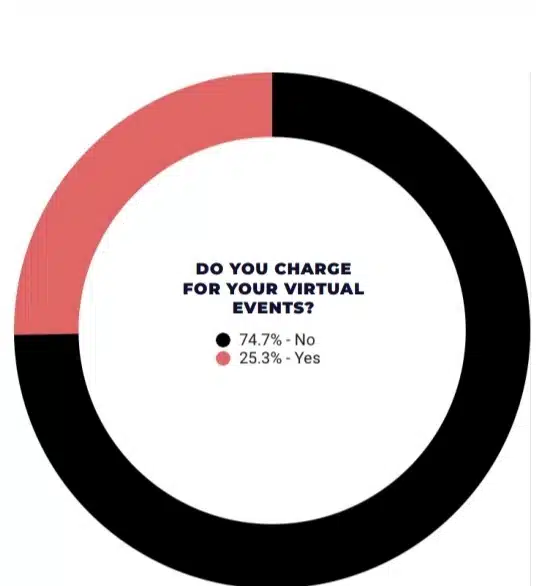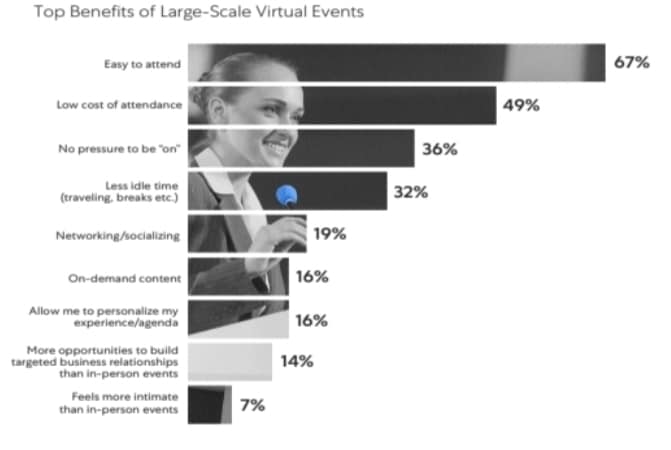
Statistics is crucial for businesses to make informed decisions and strategies, and the virtual event niche is not left out.
Due to the COVID-19 pandemic, there has been a persistent rise in the use of virtual event applications. In a nutshell, virtual events allow individuals to interact in a virtual environment on the web, rather than meeting in a physical location.
Do you find it difficult to make informed decisions about your virtual event? You need not worry because I have curated all need-to-know statistics to help you plan, market, and host a successful event.
Notwithstanding, before we look at the virtual event statistics, we need to know the different types of virtual events.
Different Types Of Virtual Events
The main types of virtual events:
- Webinar
- Virtual conferences.
- Internal hybrid event
- External hybrid event
Let me explain them a bit:
1. Webinar
A webinar is an online event that is hosted by an organization/company and broadcast to a select group of individuals through their computers via the Internet.
2. Virtual Conference
Virtual conferences allow remote participants to access live onsite meetings and events from their computers anywhere in the world.
3. Internal Hybrid Event
Internal hybrid events are programs held to benefit a company’s internal staff, including clients and partner employees and leadership.
4. External Hybrid Event
An external hybrid event is for attendees outside your company or organization. Examples of external hybrid events would be conferences, summits, concerts, parties, virtual social hours/networking, seminars, workshops, classes, trade shows, and product launches.

General Virtual Event Statistics
1. The global virtual event market is expected to grow at a CAGR of 21.4% between 2022–2030. (source)
2. 74% of businesses say virtual events are essential to their overall marketing strategy. (source)
3. The virtual event market revenue in 2021 was over $116 billion. However, by 2030, the revenue is expected to reach $810.2 billion. (source)
4. In 2021, 92% of organizers shifted to virtual events. In 2022, the number rose to 98%. 67% of companies used hybrid events as a strategy for their brand growth. (source)
5. 43% of attendees plan to attend more virtual conferences in 2023. However, 48% plan to attend in-person events, and 41% say they will attend virtual roundtables. (source)
6. In 2022, 94% of surveyed companies planned to host virtual events. (source)
7. The primary reason why people attend virtual events is to learn more about the company and the product. (source)
8. 99% of over 2000 surveyed small businesses say hosting webinars is in their marketing plan. (source)
Virtual Event Attendance Rate Statistics
9. In the previous two years, there has been a 66% increase in webinar live attendance. (source)
10. More than 68% will register for your virtual or hybrid event a week before the event date. (source)
11. Before the Covid-19 pandemic and lockdown, only 45% of people attended virtual events. Now, the number has grown to 87% due to the pandemic and its effects. (source)
12. For 46% of marketers, attendance is their greatest challenge regarding in-person events. (source)
13. The average number of attendees for virtual events is 1,356. This is more than the average number of 908 attendees for regular meetings. (source)
14. 45% of companies use total registration and attendance numbers to measure the success of their virtual event. (source)
Virtual Event Costs Statistics
15. 74% of event marketers do not charge for virtual event attendance. (source)

16. Hosting a small virtual event with about 10–100 people can cost $50–$250 monthly. However, large-scale events have between 500 and 2500+ attendees, costing between $625 and $8,000 per month. (source)
17. 33.7% of event marketers report that the average cost per virtual event attendee is between $500 to $1,000. (source)
18. The average sponsorship package for a virtual event costs $8,456. (source)
19. 87% of event planners try to use platforms that allow virtual booth sponsorship. (source)
20. About 32% of businesses cited pricing as the top challenge they face regarding hybrid events. (source)
21. The cost of hosting small virtual events (250 attendees or fewer) is between $3,000–$15,000. However, larger events can cost between $5,000–$30,000. (source)
22. Only 10% of virtual events are paid, as opposed to over 25% of hybrid or in-person events. (source)
23. 57.7% of businesses plan on increasing their budget for online events. 35.4% say they are not sure. (source)
24. 74% of B2B virtual event organizers need six months to see a positive ROI. (source)
Virtual Event Benchmarks, Challenges, And Success Statistics
25. 74.9% of event planners switched from in-person events to virtual events due to COVID-19 in 2020. A report revealed that 47% of event planners canceled their events, 39.8% postponed their events, and 74.9% moved to virtual events due to COVID-19 in 2020. (source)
26. The average promotion time for a virtual event is 56 days. (source)
27. 93% of event organizers plan to invest in virtual events moving forward. (source).
28. 40% of event marketers agree that email marketing is the most effective channel for promoting virtual events. (source)
29. 59% of marketers say they will cancel an in-person event to accommodate a virtual event if “push came to shove.” (source)
30. However, for B2B marketers, 80% of them say their website is the most effective marketing channel. (source)
31. There’s an average of 20 speakers in a virtual event. (source)
32. 93% of surveyed marketers plan to “pivot” from in-person to virtual events in 2023. (source)
Out of this percentage, only 30% have written down their plan.
33. 80% of people join virtual events for educational purposes. (source)
34. For most people, small virtual events need between 3-6 weeks to be successfully promoted. However, 65% of marketers say they need more than six weeks for large virtual events. (source)
35. 85.3% of event marketers believe virtual event experiences are here to stay. After 2020, It’s no news that people are becoming more accustomed to online experiences. (source)
36. 87% of marketers consider the opportunities generated by virtual events as a success factor. (source)
37. According to surveyed organizers, the top 3 benefits of virtual events are more registrations, increased attendee engagement, and higher ROI. (source)
38. 68.8% of event marketers feel it is challenging to provide networking opportunities when hosting a virtual event. (source)
39. 71% of event organizers rank deals closed as a success factor. (source)
40. 85% of marketers consider attendee satisfaction as a success factor. (source)
41. 43% of marketers find replicating event formats on a virtual model challenging. (source)
42. 39.5% of event organizers consider it easy to find great speakers for virtual events. (source)
43. Virtual events’ logistics challenges 52.5% of event marketers. (source)
44. 91% of surveyed companies say their virtual event is successful. (source)
45. 54% of event planners are focused on attendee experience rather than logistics. (source)
46. 38% of marketers say they face technical problems when hosting virtual events. (source)
47. 70% of event planners say good microphones are critical to a successful virtual event. (source)
48. 67% of businesses find it more beneficial to host hybrid events. (source)
49. 67.7% of event marketers find it difficult to keep attendees engaged. (source)
Virtual Event Engagement Statistics
50. 89% of marketing leaders admitted they use pre-recorded videos for digital consumer engagement. (source)
51. Virtual events are 150% more likely to be unsuccessful if they lack attendee engagement. (source)
52. 45.3% of surveyed business marketers say they run online events to engage with their target audience. (source)
53. 62% of event marketers say a mobile app helps drive audience engagement in virtual events. (source)
54. 73% of virtual event attendees are satisfied with their event experiences. (source)
55. 71% of marketers use polling to boost audience engagement. (source)
56. According to 67% of virtual event attendees, the top benefit of these events is that they are easy to attend. 49% say these events require low cost to attend, and 36% say there is no pressure to be present. (source)

57. Over 57% of B2B marketers prefer to attend the in-person version of a hybrid event than the virtual one. 33% say they like the virtual version, while 10% had no preference. (source)
Virtual Event Software Statistics
58. Webinars are the most preferred/used virtual event format. 51% of surveyed virtual events visitors say they prefer webinars, while 43% say they prefer live meeting software. (source)
59. 50.3% of surveyed companies who run virtual events say they prefer using Zoom as a virtual event platform. 12% say they use Microsoft Team, while 9.4% use Facebook Live. (source)
Virtual Event Fatigue Statistics
60. 50% of surveyed B2B tech marketers and influencers worldwide say customers were becoming “significantly fatigued” with virtual events. Another 40% say their buyers are becoming somewhat fatigued. (source)
61. About 54% of virtual event attendees say experiencing Zoom fatigue is their biggest challenge when attending virtual events. (source)
62. According to experts, a typical virtual event should last 3–5 hours. Anything more than that can lead to more virtual fatigue. (source)
63. 38% of surveyed companies said their biggest challenge when running a virtual event is when participants experience Zoom fatigue due to many similar events. (source)
Hybrid Event Statistics
64. Of the 40% of marketers planning to use virtual events in 2023, 18% included hybrid events. (source)
65. 97% of surveyed respondents hope to see more hybrid events (source).
66. Over 90% of companies believe that all large-scale events will be virtual or hybrid in 2023. (source)
67. 57% of marketers prefer the in-person version of hybrid events more than the virtual version. (source)
68. 49% of B2B marketers say their most significant obstacle to a successful hybrid event is trying to make both the physical and virtual experience equally good. 42% say their most significant barrier is hybrid logistics management, and another 36% say it is convincing their target audience to come in person. (source)
69. 43% of C-suite executives in Japan, the U.K., France, the U.S., and the Netherlands say they invest in hybrid experiences to offer more innovative, personalized products and services. 40% of the respondents say they do so to help their audience feel more connected. (source)
70. According to 8,227 marketers surveyed in 2021, 40% of their events were predicted to be virtual in 2022. In-person and hybrid events had 35% each. (source)
Final Thoughts On This Virtual Event Statistics
These virtual event statistics tell you that virtual events are here to stay. Hosting a virtual event should be a crucial part of your 2024 marketing plan. People attend these events to learn more about your company and what you offer.
Use these virtual event statistics as a guide to creating a solid plan for hosting virtual events in 2024.
Related posts:
- Ultimate List of Performance Management Statistics & Trends in 2024
- 36 Interesting Social Worker Burnout Statistics for 2024
- 40+ Top Workplace Conflict Statistics You Should Know [2024]
- 50+ Latest Life Coaching Statistics And Huge Trends In 2024
- 73 Revealing Workplace Distraction Statistics [2024]
- 47+ Important 4-day Work Week Statistics You Must Know In 2024
- 46 Crucial Amazon Advertising Statistics, Trends & Strategies For 2024
- 41+ Important Communication Skills Statistics & Trends For 2024
- 15 Crucial Body Language Statistics To Know (Fun Facts)
- 39 Best Emotional Intelligence Statistics To Know In 2024
- 29+ Important Fear of Public Speaking Statistics To Help You In 2024
- 37+ Best Copywriting Statistics & Trends to Help You in 2024
- 51+ Important Podcast Advertising Statistics To Know In 2024
- 101+ Important Social Media Advertising Statistics & Trends To Help You In 2024
- 100 Top Digital Marketing Vs. Traditional Marketing Statistics To Know In 2024
- 45+ Multi-Level And Network Marketing Statistics You Need To Know
- 67 Best Sales Funnel Statistics & Conversion Rates (Complete List)
- Latest Multichannel Marketing Statistics and Trends
- 51+ B2B Lead Generation Statistics, Facts, Trends, And Benchmarks
- 45+ Latest Omnichannel Marketing Statistics, Data, Trends, and Strategies
- 50 Trade Show Statistics and Trends to Boost Your Business in 2024
- Pay-Per-Click Statistics, Trends & Benchmarks (Amazon, Social, Google & Search Ads Stats)
- 47 Useful Organic Vs. Paid Search Statistics To Know In 2024
- 43 Direct Mail Marketing Statistics, Trends, and FAQs For 2024
- 51+ Teamwork & Workplace Collaboration Statistics To Boost Your Employee Performance
- 53 Most Important Workplace Communication Statistics To Know In 2024

